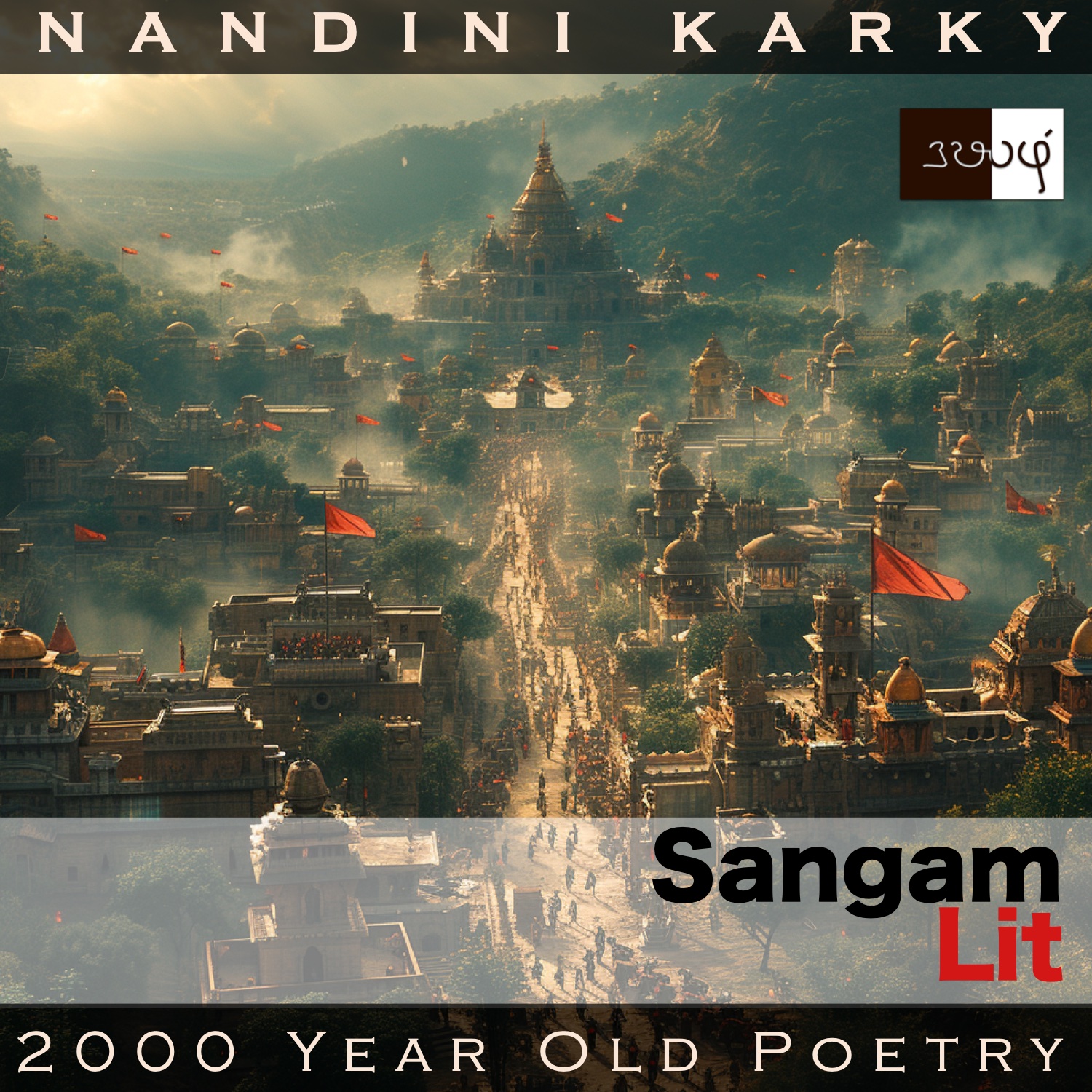Podcast: Play in new window | Download
Subscribe: Apple Podcasts | Spotify | Amazon Music | Android | iHeartRadio | Email | TuneIn | RSS | More
In this episode, we hear a subtle cry against war, as depicted in Sangam Literary work, Puranaanooru 336, penned by the poet Paranar. The verse is situated in the category of ‘Kaanji Thinai’ or ‘Defence’ and reveals the events that have led to an outbreak of hostilities.

வேட்ட வேந்தனும் வெஞ் சினத்தினனே;
கடவன கழிப்பு இவள் தந்தையும் செய்யான்;
ஒளிறு முகத்து ஏந்திய வீங்கு தொடி மருப்பின்
களிறும் கடிமரம் சேரா; சேர்ந்த
ஒளிறு வேல் மறவரும் வாய் மூழ்த்தனரே;
இயவரும் அறியாப் பல் இயம் கறங்க,
அன்னோ, பெரும் பேதுற்றன்று, இவ் அருங் கடி மூதூர்;
அறன் இலள் மன்ற தானே விறல் மலை
வேங்கை வெற்பின் விரிந்த கோங்கின்
முகை வனப்பு ஏந்திய முற்றா இளமுலைத்
தகை வளர்த்து எடுத்த நகையொடு,
பகை வளர்த்திருந்த இப் பண்பு இல் தாயே.
In recent Puranaanooru verses, we have been reading about valour and victory in the battlefield but with this song, we are going to enter an entirely new territory of voices against war. The poet’s words can be translated as follows:
“As for the king, who came with desire, he is known for his mad fury; As for her father, he does not fulfil his duties; As for the battle elephants with radiant faces and upraised tusks, adorned with thick bangles, these are no longer tied to protected trees; As for brave lords assembled with shining spears, their mouths seem tied; Alas, as many unknown instruments are played, this well-protected ancient town is in great confusion! Isn’t she without a sense of justice? Having the beauty of a ‘buttercup’ flower bud in the victorious ‘Vengai’ mountain, are the tender breasts of her young daughter, whom she has raised with joy, and who has now become the reason for enmity to grow. Indeed, this mother has no virtue!”
Time to delve into the details of this intricate verse. The poet Paranar, whom we have met often in Aham verses, and known for his depictions of historical events, starts by talking about how a superior king came seeking the hand of a maiden. This king, the poet characterises as someone known for his furious nature. Then, the poet turns to talk about the girl’s father saying the man doesn’t seem to know how to fulfil his duties for he has refused the girl’s hand in marriage. From there, the spotlight falls on the battle ready elephants, which are now being untied from their posts; The next actor on stage seem to be the spear-clad warriors who are standing tongue-tied, meaning they are not saying anything to oppose their leader’s decision. All this has led to the sound of battle drums and many other unknown musical instruments to resound aloud, leading to great anxiety in the minds of the people in that ancient town, the poet adds.
Now leaving all these prominent actors, the poet moves behind the scenes and looks at the girl’s mother and declares she is not a just person. When we ask why, what did she do, the poet goes on to praise the mother for raising a beauty with so much joy but then ends with censure about how now that girl has become the reason for enmity to fester. He concludes saying the mother seems to do nothing to solve the trouble. And so we understand, the mother is being blamed for not talking sense into her husband by saying he should go ahead and give the girl in marriage to that raging king.
The poet is in such a furore because war is imminent and he worries about the damage and ruin that’s going to fall on this ancient town. True, giving the girl in marriage would avoid the war and the ruin that follows, but is that what the girl wants, is that what her parents want? Just to appease the fury of a hostile king, should a child raised with love be sacrificed? We cannot answer this question for we do not know the particulars of this situation but we can ponder on this interesting dilemma involving an individual and the common good, regardless of space and time!




Share your thoughts...